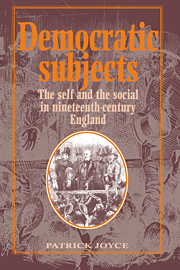Book contents
- Frontmatter
- Contents
- List of plates
- Acknowledgements
- Introduction
- Part One The sorrows of Edwin Waugh: a study in ‘working-class’ identity
- Part Two John Bright and the English people: a study in ‘middle-class’ identity
- Part Three Democratic romances: narrative as collective identity in nineteenth-century England
- Appendices
- Index
Part Two - John Bright and the English people: a study in ‘middle-class’ identity
Published online by Cambridge University Press: 10 December 2009
- Frontmatter
- Contents
- List of plates
- Acknowledgements
- Introduction
- Part One The sorrows of Edwin Waugh: a study in ‘working-class’ identity
- Part Two John Bright and the English people: a study in ‘middle-class’ identity
- Part Three Democratic romances: narrative as collective identity in nineteenth-century England
- Appendices
- Index
Summary
How clear cut is the sturdy image evoked by those two eloquent Saxon syllables, ‘John Bright’. Once the rallying cry of the masses seeking enfranchisement – the trump of doom to Whig and Tory in possession – the name in memory has since become the symbol of an honest man in politics …
… And so he lies, ‘as he himself would have wished it’, not under Gothic arches hung with conquered flags and echoing back the organ's peal, not among warriors and princes, and the statesmen who played for fame and power, but under the northern sky, in front of the humble houses of peace where he had worshipped as a child, in silence sometimes broken by the sound of workmen's footsteps up the steep flagged street, he dwells among his own people.
(first and last sentences of G. M. Trevelyan, The Life of John Bright (1913)We feel that Mr Bright is entitled to a higher eulogy than any that could be due to intellect or any that could be due to success … the character of the man lay deeper than his eloquence, deeper than anything that can be described or seen on the surface, and the supreme eulogy which is his due I apprehend to be this, that he elevated political life to a higher elevation, and to a loftier standard, and that he has thereby bequeathed to his country the character of a statesman which can be made the subject not only of admiration, and not only of gratitude, but of reverential contemplation.
(W. E. Gladstone, House of Commons, 29 March 1889)- Type
- Chapter
- Information
- Democratic SubjectsThe Self and the Social in Nineteenth-Century England, pp. 83 - 90Publisher: Cambridge University PressPrint publication year: 1994



